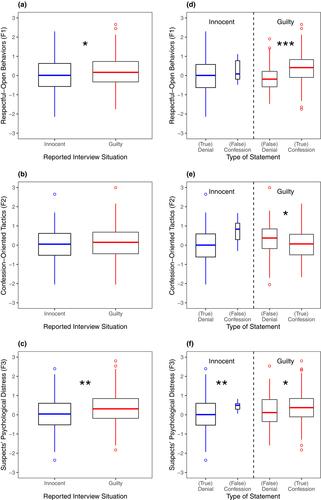How guilty and innocent suspects perceive the police and themselves: suspect interviews in Germany
Abstract
Purpose
Suspects are central participants of a police interview and can provide crucial information on the interview interactions with the interviewers. This study examined how the way suspects perceive interviews relates to (a) their reported status of being guilty or innocent and (b) their decision to confess or deny.
Methods
A total of 250 convicted offenders completed a two-part questionnaire on their perceptions during the most recent suspect interview in which they had confessed to or denied a crime they had committed (Part 1) or not committed (Part 2).
Results
Participants reported a total of 334 police interviews – 223 for which they reported being guilty and 111 for which they reported being innocent. An exploratory factor analysis showed that three latent factors described how they viewed the interviewers and themselves: Respectful-Open Behaviors (non-accusatorial interviewer behaviour, and no pressure in suspects), Confession-Oriented Tactics by the interviewer (minimization and maximization tactics), and Suspects’ Psychological Distress (insecurity, fear, and lack of self-confidence). Suspects perceived less Psychological Distress and less Respectful-Open Behaviors in reported innocent (vs. guilty) interview situations. In reported guilty interview situations, confessions were associated positively with Respectful-Open Behaviors and Suspects’ Psychological Distress, whereas denials were associated positively with Confession-Oriented Tactics. Innocent interview situations showed a positive correlation between confessions and Suspects’ Psychological Distress.
Conclusions
In this study, suspects deliver an important message to the police and the legal system: The findings substantiate the benefits of an open-minded interviewing approach, and fail to support a confession-oriented interrogation approach.


 求助内容:
求助内容: 应助结果提醒方式:
应助结果提醒方式:


